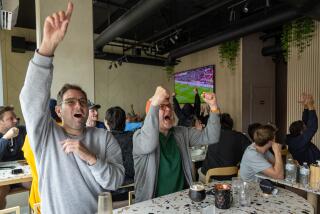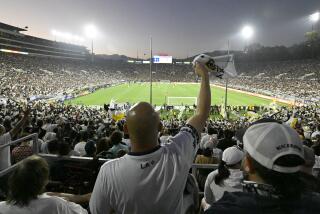When Hooligans Hit, World Cup Soccer Hurt
- Share via
ROME — Since he was a child in Bologna, Luca di Montezemolo has been a fan of the soccer team Juventus, which is the Italian equivalent of being a Yankee fan. Juventus’ home is Turin, but it has long been recognized as Italy’s Team.
On the shelves of his office in the hills high above the Olympic Stadium in Rome, Montezemolo has souvenirs from some of Juventus’ more memorable international victories. There, however, is no reminder of the most memorable of all, the victory in the 1985 European Cup Winner’s Cup over Liverpool.
“I don’t want that one,” Montezemolo said.
That game at Brussels’ Heysel Stadium is less remembered for the score than for another statistic, the death toll. In a pregame riot started by Liverpool fans, 39 people died.
As general manager of Italia ‘90, the organizing committee for next summer’s World Cup soccer tournament at 12 Italian cities, Montezemolo, 42, will be at London Thursday. In a news conference, he will show a film that begins with Paul McCartney singing “Yesterday,” and highlights of England’s championship in the 1966 World Cup.
But when the time set aside for nostalgia has passed, Montezemolo knows that he is going to be besieged with questions from the British reporters, all of whom will be asking essentially the same thing. How does Italia ’90 plan to protect the vast majority of peaceful fans whose safety could be jeopardized because of a small, but vicious, minority of hooligans?
Hooligans is the name that the English have given to the provocateurs, but not all hooligans are English. Far from it. Last weekend, there were separate incidents surrounding soccer games involving followers of teams from Wales, Greece, the Netherlands and Yugoslavia.
It is the English, however, who have Montezemolo most worried. Indeed, it is the English who have the English most worried.
There has been speculation here and in Great Britain that the English team, virtually assured of earning a berth among the 24 World Cup teams, will be assigned for its three first-round games to the island of Sardinia, because there isn’t a stadium large enough on the island of Elba.
For that purpose, Sardinia has advantages over the other 11 sites.
The island is so expensive that it might prevent those fans who are believed to cause most of the trouble from traveling there.
But for those who save their pounds and make the trip, the island is not so large that they could escape the attention of police. As for those fans who do not look for trouble, they could not complain that they have been exiled to an unappealing place.
That would seem to be a solution agreeable to almost everyone. Possible exceptions are the Sardinians.
In an interview last week, Montezemolo would neither confirm nor deny the speculation. Although he said that Italia ’90 will contribute to the decision, he emphasized that it ultimately will be made by soccer’s international governing body, FIFA.
“Maybe the island would be the best,” he said, perhaps giving an indication of his position. “But it’s not my decision.”
Even Sardinia could not solve all the potential problems unless it can arrange for England’s elimination in the first round. If England advances, it would play its next game on the mainland.
“If I had to organize Italy vs. England, no problem,” Montezemolo said. “I would put the English in one corner, and the police would watch that corner.
“But in the World Cup, we don’t know where England is going to be after the first round. English fans and Italian fans will be together. But I am confident the government authorities, the Ministers of Interior and the police will do what is necessary.”
They will have a head start because of safety measures taken by Montezemolo and Italia ’90.
About 60% of the tickets for the 52 games in the month-long tournament (June 8-July 8), are available through domestic and foreign branches of Italy’s Lavoro National Bank. To buy a ticket through the bank, a person must provide identification, which is checked against police records to determine whether he or she has been involved in a soccer-related incident.
Montezemolo admitted that the system breaks down because the other 40% of the tickets had been distributed to FIFA, national soccer federations and various other sports organizations. Some tickets no doubt will find their way to travel agencies, which cannot be expected to take the same safety precautions.
But Montezemolo is extremely proud of Italia ‘90’s most important contribution to safety, the installation of seats in all 12 stadiums. Before, Italy’s major stadium provided standing-room-only for many ticket-holders.
That is still the case throughout most of Europe. It has been cited as a major cause of injuries resulting from fights among fans at soccer games. If there had been individual seats in Hillsborough Stadium at Sheffield, England, last year for a game between Nottingham Forest and Liverpool, experts believe a tragedy that claimed 95 lives might have been avoided.
“We will have 12 beautiful stadiums with every seat individually numbered,” Montezemolo said. “For the first time in Europe’s history, we will sell tickets just for the exact number of seats. Not one more.
“That is a big sacrifice. Where we will sell one ticket for a person seated, we could have sold two for people standing.”
Meanwhile, in England in wake of the Hillsborough tragedy, the government ponders solutions--identity cards for ticket-buyers, disallowing fans of visiting teams from attending games--individual teams have acted.
In some stadiums, including Hillsborough and Liverpool’s Anfield, no standing-room tickets are sold. The Liverpool team spent $800,000 this summer to improve the safety of its stadium, which was reduced in capacity by 6,000 to 39,000.
But although there have been no notable incidents this season in the English League, 102 English hooligans were arrested for vandalism and fighting at Stockholm two weeks ago, when they followed the national team for a World Cup qualifying game against Sweden.
There were further incidents at the stadium involving 77 English fans, but police said those were instigated by Swedes.
Fighting earlier had broken out on the ferry from the Netherlands to Goteborg, Sweden, among about 300 English fans, one of whom was lost overboard.
“THEY SHAME US ALL AGAIN,” screamed the headline in London’s Daily Mail on the morning after the riot at Stockholm.
Some British government officials expressed outrage because the rioters were sent home without being charged by Swedish police.
“We just want to get rid of them,” a police spokesman said.
The next day, British Prime Minister Margaret Thatcher urged the English Football Assn. to withdraw the team from the World Cup. That is not likely to happen, but exhibition games against the Netherlands in December and Scotland in May have been canceled.
Also resulting from the violence in Sweden was the establishment of a national anti-hooligan force, the National Football Intelligence Unit, which will be based at Scotland Yard.
“We shall target these traveling criminals--that’s what they are--identifying the trends, the methods of transport and the weapons,” the Unit’s superintendent, Adrian Appleby, said last week.
He said that of primary importance to the force will be the World Cup. “We will respond to any request made by the authorities in Italy,” he said.
Montezemolo said that he is encouraged by the formation of the force.
“England has a big tradition in football, maybe the biggest tradition,” he said. “They will make a big effort to avoid what happened in the past.”
There is no clear consensus about the identity of the hooligans.
Many of them are believed to be young, unemployed and pessimistic about their chances of rising above the lower class under England’s current economic conditions.
But there is increasing evidence that their numbers also include gangs of skinheads and neo-Nazis who have less interest in soccer than in creating disturbances. The fact that none among the 300 rioters on the ferry to Goteborg had tickets to the game is an argument for those who claim that identity cards are a waste of time and money.
What is England to do?
In a letter last week to a newspaper, The Guardian, a Liberal member of Parliament, Denis Howell, wrote of the dilemma:
“My own ideas of freedom lead one to the conclusion that we do have a responsibility to our friends to protect them from all this filth, and that may be a more critical freedom to exercise than that of maintaining the freedom to travel for those who we know will abuse it.”
More to Read
Go beyond the scoreboard
Get the latest on L.A.'s teams in the daily Sports Report newsletter.
You may occasionally receive promotional content from the Los Angeles Times.






